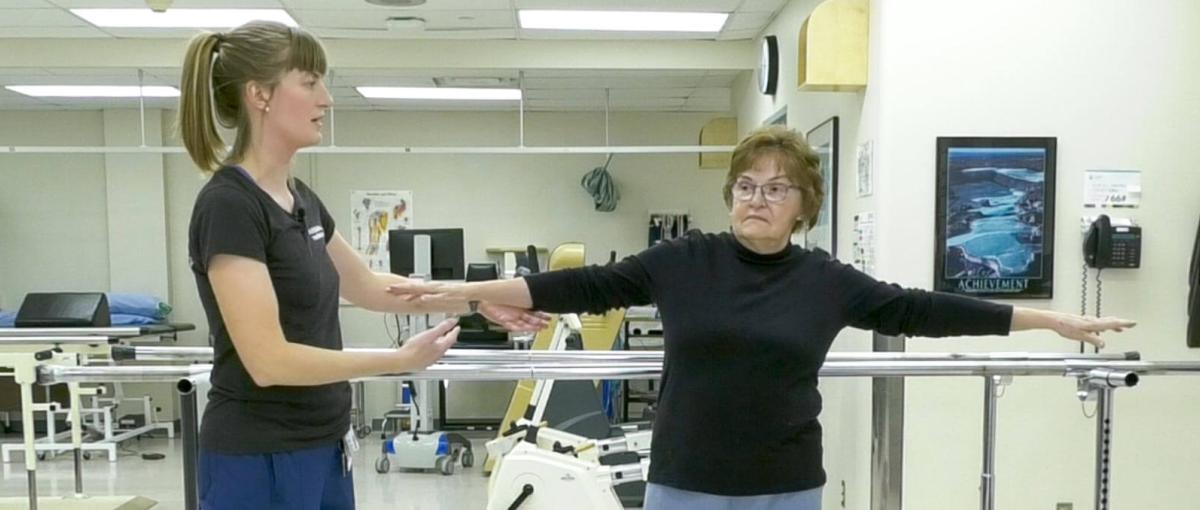Finding better balance
Strengthening and balance exercises can help older people avoid falls

March 23, 2020
By Marguerite Watson, Senior Communications Advisor, Covenant Health
Dorathy Allan is learning how to improve her balance.
“I walk all the time with my puppies. I've fallen down in water, and they've just sat there and looked at me,” she says.
Falling often is what brought Dorathy, 72, to the Better Balance class offered through the outpatient physiotherapy unit at the Misericordia Community Hospital in Edmonton. The six-week class provides strengthening and balance training to older people who have muscle weakness and balance challenges. Participants may take the class on referral from their doctor.
The class is targeted to older people because of their greater risk of falling, says Sheila Mahood, a physiotherapist with the outpatient clinic and one of the instructors of the Better Balance class. Participants work on upper and lower body strengthening with weights; static balance, such as standing in different positions and moving your head; and dynamic balance, such as moving through an obstacle course.
Research has shown that exercises focused on strength and balance can help prevent falls in older people. And as the Canadian population ages, the need for fall prevention programs will increase. Between 20 and 30 per cent of Canadian seniors fall each year, and falls are the leading cause of injury-related hospitalizations of seniors, according to the Public Health Agency of Canada. Along with harmful physical effects, falling can have negative mental health consequences, such as fear, loss of autonomy, isolation, confusion, immobility and depression.
There are many reasons for poor balance, says Sheila. Any condition related to the inner ear, vision or proprioception (awareness of your body's position and movement) can influence how a person reacts to balance changes and unstable surfaces, which can lead to falls. Medication, changes in blood pressure, poor posture, joint problems, pain, lack of confidence and neurological problems such as stroke are also factors that affect balance.
And though people of any age can have balance issues, factors that often come with age can make you more susceptible. “As we get older, we tend to lose muscle mass, and so we are not as strong or as quick to recover when we lose balance,” says Gail Elton-Smith, a physical therapist who works with stroke patients through the early intervention discharge program at St. Mary's Hospital in Camrose.
Dorathy says that learning about her physical strengths and weaknesses is helping her avoid falls.
“I know what to do now, what to do with my feet, how to keep my posture straight and then to work with that when I'm walking in the snow or the slush.”
Dorathy and Sheila demonstrate some simple static and dynamic balance exercises in the video below.

With her stroke patients, Gail uses exercises such as standing and batting a balloon back and forth, walking while turning the head and scanning the environment, and walking sideways or backwards on the sidewalk.
For people in general who have good balance and want to keep it that way, any activity that strengthens the core, like tai chi or yoga, is helpful, says Sheila. “Your pelvis is the anchor of your body, and if you can keep that stable, then you're set up pretty well.”
Walking is also a good activity for maintaining the flexibility and muscle strength needed for good balance. If you're able, start by walking 20 minutes a day, then progress to half an hour, says Gail. If that becomes too easy, try walking up a hill or tromping through snow.
Gail also suggests working on balance exercises in the pool. “Walking or trying to stand on one leg or with your feet together in water are really good because if you get knocked over, you won't hurt yourself. You'll just get wet. And the water pushing against you can really be challenging.”
The longer in life that you keep up these activities, the better your balance will be, says Sheila. “That same concept of ‘If you don't use it, you'll lose it’ applies. If you keep them up, then you're keeping those skills. And practice what you want to get better at.”
At four weeks into the Better Balance class, Dorathy is trying to keep up with her exercises at home. Some of the exercises are harder to do, but practicing helps, she says.
“I would definitely recommend the class to older people.”